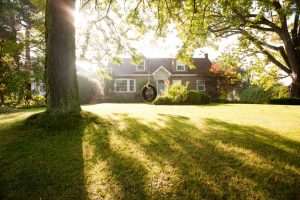By Kevin Sheehan, District Manager of The Davey Tree Expert Company’s Long Island Office
 Along with the natural beauty of summer comes rumbles of thunder, high winds, flashes of lightning and heavy rain —all of which wreak havoc on properties. Wind can completely uproot saturated trees and break branches when summer storms hit. A hazardous tree that is sick or damaged can cost potential homebuyers thousands. Not to mention the severe impact on the landscape—one of the biggest contributors to a home’s value.
Along with the natural beauty of summer comes rumbles of thunder, high winds, flashes of lightning and heavy rain —all of which wreak havoc on properties. Wind can completely uproot saturated trees and break branches when summer storms hit. A hazardous tree that is sick or damaged can cost potential homebuyers thousands. Not to mention the severe impact on the landscape—one of the biggest contributors to a home’s value.
Identifying common defects in trees before a storm hits is crucial to preserving precious curb appeal. Homeowners can prevent damage to their property in a few simple steps.
Branch Out
Look for clear signs of damage. A tree with an abundance of dead branches has a higher potential to be impacted by stormy weather. Deep splits and cracks that extend through the bark and into the trunk signal signs of severe damage. In advanced stages, decay, wood cavities and cankers can create hazardous conditions. Weak branch unions that are fused by bark also signal declining tree health.
Related: Staging Curb Appeal for Web Appeal
Poor Architecture
When it comes to stormy weather, heavy tree canopies act as sails that catch wind. Branches and heavy limbs could barrel toward the home if not properly cared for. Poor tree architecture is characterized by excessive leaning or branches growing out of proportion with the rest of the crown. Odd growth patterns may indicate general weakness or structural imbalance.
Get to the Root of It
Without a strong root system, trees are more likely to blow over in stormy weather. Look out for nearby construction that may sever large roots or compacted soil that doesn’t allow for healthy root growth.
The solution to keeping happy and healthy trees is simple: proper care and tree maintenance. Regular pruning thins the tree canopy, allowing wind to blow through it instead of against it. Pruning also removes potentially hazardous dead or weak branches.
Landscape inspections are crucial when it comes to increasing curb appeal. Schedule a consultation with a certified arborist to evaluate tree species, soil conditions, wind exposure, defects, overall health, and to determine a tree’s hazard potential.
The Davey Tree Expert Company’s more than 8,600 employees provide tree care, grounds maintenance and environmental consulting services for the residential, utility, commercial and government markets throughout the U.S. and Canada. Davey has provided Proven Solutions for a Growing World since 1880 and has been employee-owned for 37 years.








Great Advice! I Recommend some of these same strategies to my clients
Oldie but goodie here! Love it 🙂
Awesome! Thank you for sharing your ideas, it’s wonderful to hear some advice about preserving curb appeal. Great job!